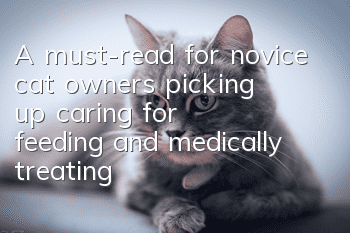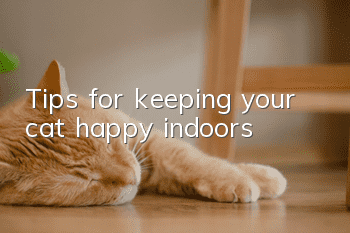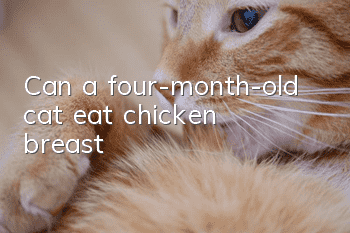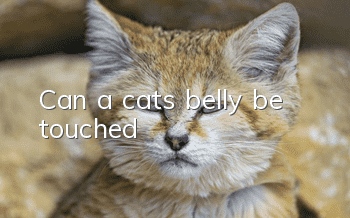A must-read for novice cat owners: picking up, caring for, feeding, and medically treating cats is all what you want to know!

First of all, before you take it home, remember to prepare all the cat's supplies, including cat food, water bowls, food bowls, cat litter, and cat litter boxes.
Taking a kitten home is a very lucky thing. From then on, you have an extra child. Before you prepare to raise a cat, you must be mentally prepared to raise it for a lifetime. Because once a kitten is released into the wild, its lifespan is only 2 to 3 years at most.
Let’s talk about the preparations a novice cat owner needs to make!
Now you have to decide whether you want to raise a big cat or a kitten. (It is recommended that novices choose cats that are more than two months old and can eat cat food and defecate by themselves.)
1. Cat Picking:
Before taking the cat home, you should first make sure it is healthy, whether it has been dewormed, and do a simple physical examination.
It is best to use a take-out bag or take-out box when picking it up.
Don’t spend too long on the way. Observe whether the cat’s condition is normal on the way. Pay attention to the hot weather. If you stick out your tongue or open your mouth, it is probably too hot. You need to lower the air conditioner temperature and don’t let the cat on the road. Heatstroke.
Don’t rush to hug or kiss the cat when it arrives home. Families with children are especially careful not to let children tease the cat first. Cats are notoriously sensitive and slow-warming animals. To prevent your cat from being frightened, give it time to become familiar with its new environment. It is recommended to put the cat in a room first and not disturb it.
Do a good job of protection, remember to close doors and windows, and put away chocolate, coffee, and pesticides to prevent cats from coming into contact.
There is no limit to food. It will eat when it is hungry, so don’t worry.
2. Nursing:
Bathing and deworming:
1. Take a bath: For this new member, you need to do a health check. Observe whether the cat is dirty, whether there are fleas, and whether it has colds or colds.
Kittens under three months old will have weaker resistance, so try not to bathe them. If a cat over three months old takes a bath, the doors and windows should be closed, and the cat should be dried with hot air in time to prevent colds.
2. Deworming: Cats are mammals covered with fur and will be disturbed by internal and external parasites. So they must be eliminated in time.
Deworming is divided into internal and external, butNowadays, there are internal and external anthelmintic drugs that are available. If necessary, you can go to our mall to check out the "Dapai" internal and external anthelmintic drugs. The price is guaranteed to be much cheaper than on a certain website.
Dosage: once for 6 weeks, 8 weeks, 10 weeks, and 12 weeks. Then take it once a month until six months.
Cats over six months old should eat once every three months.
Cats over one year old should eat once every six months.
Pregnant female cats are not recommended to take deworming medicine. If necessary, take it once 10 days before giving birth. Take it once every 2 weeks and 4 weeks after breastfeeding.
The dosage of anthelmintics should be judged based on body weight~ Don’t make a mistake
Vaccine: Kittens need two injections of cat triple + one injection of rabies vaccine. Generally, when they are more than two months old, they can be dewormed first. After the deworming, the first injection will be given one week later, and then 15-21 days later. Get the second vaccine, and then get the rabies vaccine 15-21 days later. From now on, a rabies vaccine once a year will be enough.
Be diligent about cleaning your home. Kittens may get cat moss if they are exposed to too much dust, which can be transmitted to family members in severe cases. Maintain good hygiene, clean frequently, and preferably use a vacuum cleaner every few days.
Don’t feed the kitten randomly, just give it cat food and canned food. When he grows up, you can give him some yogurt or snacks, as long as they are not too salty.
Pay attention to the kitten's poop. Normal poop should be dry, long strips or small round pieces. Pay attention to those with bloodshot eyes, and pay attention to those that are shapeless.
If the kitten has diarrhea, don't give canned food or meat. It will usually be fine in a few days. If it doesn't feel better in three or four days, take it to the pet hospital for a checkup. If necessary, you can give it some medicine.
You can feed some goat milk powder, which is also available in our AiPet.com mall. The price is pretty good~ Go check it out if you need it~
Stand-up nutritional supplements: probiotics (must have!!!)
Care products: cat internal and external deworming medicine (recommended for great pampering), cat eye drops, cat bath shampoo, small syringes for cat medicine, hair removal cream, cat grass, and cat combs.
3. Feeding:
Cats are mammals, but their eating habits are different from those of humans. It is a carnivore, but there are many things it cannot eat.
Milk cats will go through three stages during their growth period.
The first period is the rapid growth period. At this time, kitten food should be eaten, and it is best to add cat milk powder for cats under 3 years old. Eat 5 to 6 meals a day. (After eating, the catThe cat’s hair will be shiny) Cats aged 2 to 6 months enter a period of rapid growth after weaning. High-quality food with balanced nutrition and high protein and calories is needed to meet the needs of body growth.
Kittens have small appetites and mouths, but they grow and digest very quickly.
Kittens must eat specially formulated high-quality kitten food. The characteristic of this type of high-quality kitten food is that it uses meat as the main raw material, is very easy to digest, and contains a large amount of nutrients, which can meet the special nutritional needs of kittens.
1 month old cat food: goat milk powder + soaked soft cat food.
Feeding frequency: once every 4 hours, 6 meals a day. (Don’t wean off milk too early. Cat food should be 5 to 6 grains at a time) Feeding amount: Increase as appropriate. Concentration: one spoonful of milk powder and two spoons of warm water. The water temperature is still warm.
Excretion: Prepare a litter box for the kitten. The kitten can now try using the litter box. Put it into the litter box and pull the litter out twice with your paws. It will start playing.
Food for 2-month-old cats: Softened cat food + goat milk powder
Feeding frequency: once every 6 hours. More than 4 meals a day. (Cat food is used as the staple food. Add Miaoxian Bao appropriately but not too much. Feed goat milk powder once a day. Excretion: Will defecate on its own.
3-month-old cat food: dry cat food + Miaoxianbao and occasional goat milk powder
Feeding frequency: once every 8 hours, more than 3 meals a day. (Goat milk powder is still given a little every day)
Food for cats 4 months and above: dry cat food + Miaoxian bag
Feeding frequency: one meal in the morning and one meal in the evening. At this time, the cat enters the period of stripping and body growth, and will gradually change from a sharp mouth and monkey cheeks to a big bun face. If you like it, give it one more meal every day. The second period is the rapid maturity period.
Choose to eat high-quality dry cat food + canned cat food. One meal each in the morning and evening. If you still want to eat, add another meal. Cats over 6 months old will reach sexual maturity. The cat's growth rate began to slow down, and he was not as active as before. At this time, they eat a larger amount at each meal, so they can reduce the number of meals per day. Although the cat's size is very similar to that of an adult cat at this time, it will actually grow up every day!
Cats like to eat high-quality dry cat food during this period, with appropriate canned food!
The third period is the adult stage.
At this time, the food should be replaced with adult cat food. Just feed it once every morning and evening. Adult cats no longer need the large amounts of energy and nutrients provided by kitten food.
When changing food, follow the rules for changing pet food and change it slowly within 5 to 7 days. Indoor cats should pay attention to the problem of obesity. You can prepare a personal scale to monitor your cat (very easy to use).
4. Medical treatment
Cats are very strong hunter-type creatures. Cats are always in pain and will not show it. It is said that some seriously ill cats will suddenly run away from home, not wanting their owners to see them dying.
Since we have raised such a proud and domineering creature, we, as owners, must use the ability to observe words and emotions.
Significance of a sick cat 1: Lack of energy and hiding;
This is dangerous. When you get home, you find that your beloved cat does not welcome you happily, but hides in the nest alone; when you take out its favorite toy, it does not pounce on you excitedly; when you come When I went to it and called it gently, it didn't respond at all...
A cat's lack of energy is telling you that it is sick. Lack of energy in cats is a precursor to many diseases. When a cat is slow in movement, introverted, and unresponsive, you must pay attention to observe its other reactions to judge its condition.
Signs of cat illness 2: dry and hot nose; healthy cats’ noses are moist and cold, except when the cat is sleeping and just waking up. If the cat’s nose is dry, it means the cat is not very comfortable.
If the cat's nose is dry and hot, you should measure the cat's temperature immediately. The cat is likely to have a fever.
Signs of cat illness 3: Abnormal respiratory tract; If a cat has respiratory symptoms, such as sneezing, coughing, difficulty breathing, etc., it may be a problem with the cat’s nasal bronchus or a cold. Symptoms of cat illness 4: vomiting; Vomiting is also one of the important symptoms of cat illness. Owners should pay attention to observation. If the cat’s spirit and appetite are normal after vomiting, it is usually just vomiting hair balls, so don’t worry about it;
If vomiting persists, you need to fast from food and water for 24 hours and feed lactase enzyme. If the vomiting symptoms disappear and return to normal after fasting and taking medicine, it may be minor gastroenteritis caused by accidental ingestion. If the vomiting persists and worsens, seek medical attention immediately.
Signs of cat illness 5: Drooling; When a cat has symptoms of drooling or a foul-smelling mouth, pay attention to the cat’s mouth. The causes of drooling include ingestion of foreign objects (such as chicken bones, needles and other sharp objects), oral ulceration, etc. It may also be caused by eating hard food. Cat food, tongue bubbling caused by lack of vitamin B. In severe cases, it may be feline leukemia. Symptoms of Cat Sickness 6: Lameness; When a cat is afraid to touch the ground with its limbs or is limping, it may be a puncture on its foot in a minor case, or a fracture in a serious case. Symptoms of cat illness 7: Exposed third eyelid; When a cat is sleeping, if you open its eyelids, you can see a white film attached to the eyeball. This film is called the third eye. When a cat has a fever or is seriously weak, it will reveal its third eye. Symptoms of cat illness 8: urination, frequent urination, and urinary incontinence; oneOnce a cat, especially a male cat, has a problem with its urinary system, parents must pay attention immediately, because once a cat holds urine for more than 24 hours, it will cause azotemia or even renal failure and uremia, and the consequences will be very serious.
If cat urinary tract disease is treated in time, the cat can live a healthy life, but if the disease is delayed, it will pose a great threat to the cat's life.
Let’s talk about common symptoms:
NO1. Cat ringworm Ringworm is a common skin disease in cats. The most obvious characteristic of ringworm is hair loss. Start from the cat’s head and slowly stroke the hair along the cat’s head to find out some parts of the cat where ringworm occurs. There will be dander falling off.
NO2. Diarrhea For a cat with diarrhea, you must first find out the cause of his diarrhea.
1. Indigestion:
This is the most common cause of loose stools, especially in kittens under six months old. Simple indigestion is also called loose stools.
a. Change food or catch a cold
Generally, kittens will have diarrhea because of changing food. Because their systems are very delicate and lack a lot of digestive enzymes, they will have loose stools if they are not properly digested. If left unchecked, they will become looser and looser, leading to dehydration, which is very dangerous. Another one is catching a cold. Generally speaking, as long as the cat's energy and appetite are the same as usual, it can be considered that there is a sudden change in vitality or diarrhea caused by catching a cold. The cat should be properly kept warm and its digestion should be adjusted. In these two cases, you should stop feeding canned food, meat and other difficult-to-digest foods, and feed two tablets of lactobacilli powder or Mommy Love (multi-dimensional lactobacillus powder, which can be purchased in pharmacies, for babies) at a time. But they cannot be fed together. Just use a syringe without a needle. 2. Enteritis: The symptoms of enteritis are that in addition to diarrhea, the cat’s mental state is not good and the body temperature is elevated.
In this case, the cat’s symptoms are very similar to feline infectious enteritis (cat distemper). After confirming that the cat has been immunized, you can treat it according to the following methods. Otherwise, please go to the hospital for examination and diagnosis as soon as possible.
The doctor will give it some anti-inflammatory drugs. After taking anti-inflammatory drugs, the cat needs to be fed some digestive aids based on live fungi, such as lactase, Mommy's Love, etc., to help the cat restore its digestion ability. You can also go to the drugstore to buy "Smecta" to stop diarrhea for cats. The difference from Qingda is that it uses physical methods to take bacteria out of the body. 3. Parasites: If you need to take medicine to fight insects, it is best to go to the hospital for a stool test first, and then use targeted medicine. Generally speaking, you need to take internal anthelmintics once every 3 months.
Daily care for cats with gastrointestinal discomfort:
1. Pay attention to diet: do not feed food that is not suitable for digestion, ensure drinking water, remember not to feed raw water, and do not feed food that is too salty.
2. Pay attention to the hygiene and temperature of the cat’s living environment. If conditions permit, bask in the sun for 1-2 hours a day.
3. Appropriately supplement some drugs that help digestion, such as dry yeast tablets. Cats will take the initiative to eat yeast tablets because of their light fragrance, while Qingda cannot feed them regularly for a long time, which may cause Hearing loss.
Cats also need to have their ears picked out and nails trimmed regularly~ New parents should pay attention!
- When is the latest time for cat cryptorchidism to fall off?
- What should I do if my cat loves to bite?
- The Best Cat Body Care Guide
- If you want to raise a cat, how should you choose one?
- Causes of cat hair loss and 9 care methods
- Why do male cats still urinate after being neutered?
- Is it a cat-inherited trait that kittens love to drink water?
- What are the benefits of cats basking in the sun? 99% of cat owners do it wrong!
- How to solve the problem of cats urinating everywhere
- What are some good ways to punish a cat that makes mistakes? Specialized in treating unconvinced kittens!



